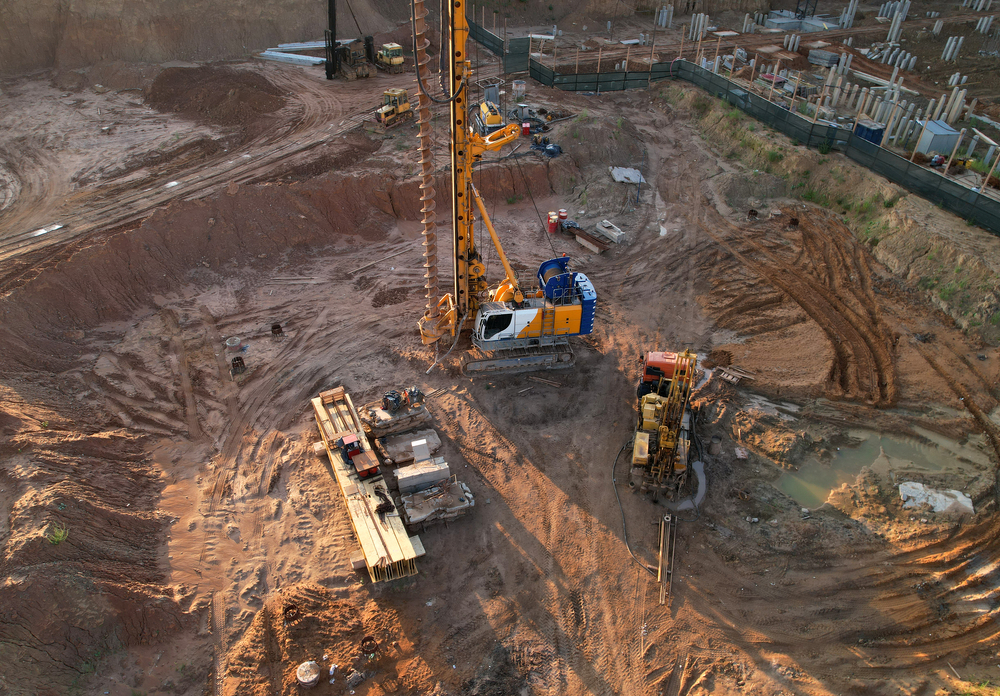Some Known Details About Geotheta
Some Known Details About Geotheta
Blog Article
Not known Facts About Geotheta
Table of ContentsThe Best Guide To GeothetaSome Known Questions About Geotheta.Our Geotheta IdeasOur Geotheta IdeasGeotheta - An Overview

They conduct website examinations, collect samples, perform laboratory tests, and examine data to evaluate the suitability of the ground for building jobs - Geo Tech Engineer. Based upon their searchings for, geotechnical engineers offer suggestions for structure design, slope stability, preserving frameworks, and mitigation of geotechnical dangers. They team up with other professionals, such as designers, structural engineers, and building teams, to make sure that geotechnical factors to consider are incorporated right into the general job layout and execution
By analyzing the actions and homes of soil and rock, they can identify potential geotechnical threats such as landslides, soil settlement, or slope instability. Their experience assists protect against failings or crashes that might jeopardize lives and building. Below are some in-depth duties and obligations of a geotechnical engineer: Website Examination: Geotechnical designers conduct website examinations to collect data on subsurface problems.
They analyze the data to understand the residential properties and actions of the dirt and rock, including their toughness, permeability, compaction qualities, and groundwater conditions. Geotechnical Evaluation and Style: Geotechnical designers analyze the data accumulated during website examinations to evaluate the stability and viability of the site for building tasks. They do geotechnical estimations and modeling to assess aspects such as birthing capacity, settlement, slope stability, side planet stress, and groundwater circulation.
Some Known Questions About Geotheta.
Structure Layout: Geotechnical designers play an essential function in creating foundations that can safely support the designated structure. They assess the soil problems and tons requirements to figure out the suitable foundation type, such as shallow structures (e.g., grounds), deep structures (e.g (https://www.anyflip.com/homepage/zuylo)., piles), or specialized strategies like soil renovation. They take into consideration variables such as settlement restrictions, birthing capability, and soil-structure communication to create ideal structure layouts
They assess building plans, display site activities, and carry out area assessments to confirm that the layout recommendations are complied with. If unpredicted geotechnical problems occur, they examine the circumstance and offer referrals for remediation or adjustments to the style. Threat Analysis and Mitigation: Geotechnical designers evaluate geotechnical risks and threats connected with the project website, such as landslides, liquefaction, or soil disintegration.

Collaboration and Communication: Geotechnical designers function closely with various other professionals included in a project, such as engineers, structural engineers, and construction groups. Reliable communication and collaboration are essential to incorporate geotechnical considerations into the general project style and construction process. Geotechnical engineers give technical experience, response queries, and make certain that geotechnical demands are fulfilled.
Getting The Geotheta To Work
Below are some kinds of geotechnical designers: Structure Engineer: Structure engineers specialize in developing and evaluating foundations for frameworks. They assess the soil conditions, load requirements, and site qualities to establish the most suitable foundation type and design, such as superficial foundations, deep foundations, or specialized methods like heap foundations.
They review the factors influencing slope security, such as dirt residential or commercial properties, groundwater conditions, and incline geometry, and create techniques to prevent slope failures and alleviate risks. Earthquake Engineer: Earthquake designers focus on examining and making structures to endure seismic pressures. They evaluate the seismic risk of a site, assess dirt liquefaction potential, and create seismic layout standards to check my source guarantee the safety and security and durability of frameworks throughout quakes.
They do field testing, collect samples, and assess the collected data to identify the soil buildings, geologic developments, and groundwater problems at a website. Geotechnical Instrumentation Designer: Geotechnical instrumentation designers concentrate on tracking and gauging the habits of soil, rock, and frameworks. They set up and keep instrumentation systems that monitor factors such as dirt negotiation, groundwater levels, slope activities, and structural displacements to assess efficiency and offer very early warnings of possible issues.
Some Known Facts About Geotheta.
They perform examinations such as triaxial examinations, combination examinations, direct shear examinations, and leaks in the structure tests to collect information for geotechnical analysis and style. Geosynthetics Designer: Geosynthetics engineers specialize in the layout and application of geosynthetic materials, such as geotextiles, geogrids, and geomembranes. They make use of these products to boost soil security, strengthen inclines, offer drain services, and control erosion.
They often tend to be investigative individuals, which suggests they're intellectual, introspective, and inquisitive. They are curious, methodical, reasonable, logical, and sensible. Some of them are additionally social, indicating they're kind, charitable, participating, person, caring, helpful, compassionate, tactful, and pleasant - Consulting Engineers.
In the workplace atmosphere, geotechnical designers utilize specialized software application tools to do calculations, create styles, and examine information. They prepare reports, evaluation job specifications, communicate with customers and group members, and coordinate job tasks. The office setup supplies a conducive environment for study, evaluation, and cooperation with other specialists included in the task.
What Does Geotheta Mean?
They regularly visit job websites to carry out site investigations, analyze geotechnical problems, and gather information for evaluation. These brows through entail traveling to different locations, often in remote or difficult terrains. Geotechnical engineers may do soil sampling, conduct examinations, and monitor building activities to ensure that the geotechnical elements of the task are being applied properly.
Geotechnical designers additionally function in specialized geotechnical labs. Geotechnical laboratory engineers function thoroughly in these atmospheres, handling screening equipment, operating tools, and videotaping data.
Report this page